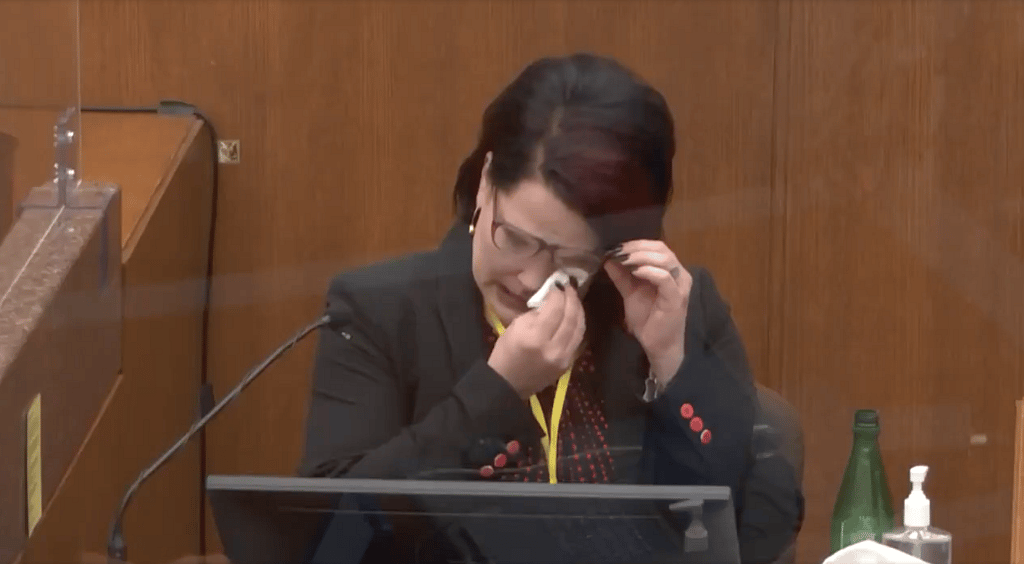George Floyd’s girlfriend cried on the witness stand Thursday as she told the story of how they first met in 2017 at a Salvation Army shelter where Floyd was a security guard with “this great Southern voice, raspy.”
“May I tell the story?” 45-year-old Courteney Ross asked on Day Four of former Officer Derek Chauvin’s murder trial. “It’s one of my favorite stories to tell.”
Prosecutors put her on the stand as part of an effort to humanize Floyd in front of the jury and portray him as more than a crime statistic.
Ross said she had gone to the shelter because her sons’ father was staying there. She said she became upset because the father was not coming to the lobby to discuss their son’s birthday. Floyd came over to check on her.
“Floyd has this great Southern voice, raspy. He was like, `Sis, you OK, sis?’” Ross recalled. “I was tired. We’ve been through so much, my sons and I, and (for) this kind person just to come up and say, ‘Can I pray with you?’ … it was so sweet. At the time, I had lost a lot of faith in God.”

Read More: Chauvin trial witness tears up during testimony: ‘Y’all is murderers’
Ross also explained that both she and Floyd struggled to overcome opioid addiction.
Minnesota is a rarity in explicitly permitting such “spark of life” testimony ahead of a verdict. Defense attorneys often complain that such testimony allows prosecutors to play on jurors’ emotions.
The testimony came a day after prosecutors played extensive video footage: Security-camera scene of people joking around inside a convenience store, and bystander and police bodycam video of officers pulling Floyd from his SUV at gunpoint and struggling to put him in a squad car before they put him on the ground. It also showed Floyd being loaded into an ambulance.
Chauvin, 45, who is white, is charged with murder and manslaughter, accused of killing the 46-year-old Black man by kneeling on Floyd’s neck for 9 minutes, 29 seconds, as he lay face-down in handcuffs. The most serious charge against the now-fired officer carries up to 40 years in prison.
Floyd’s struggle with three police officers trying to arrest him, seen on body-camera video, included Floyd’s panicky cries of “I’m sorry, I’m sorry” and “I’m claustrophobic!” as the officers tried to push Floyd into the back of a police SUV.
At one point, Floyd bucks forward, throwing his upper body out of the car. Officers eventually give up, and Floyd thanks them — and then is taken to the ground, facedown and handcuffed. Chauvin knee pins his neck, another officer’s knee holds his back and a third officer holds his legs, with the officers talking calmly about whether he might be on drugs.

“He wouldn’t get out of the car. He just wasn’t following instructions,” Officer Thomas Lane was recorded saying. Lane also asked twice if the officers should roll Floyd on his side, and later said he thinks Floyd is passing out. Another officer checked Floyd’s wrist for a pulse and said he couldn’t find one.
The officers’ video was part of a mountain of footage and witness testimony Wednesday showing how Floyd’s alleged attempt to pass a phony $20 bill at a neighborhood market last May escalated into tragedy.
When Floyd was finally taken away by paramedics, Charles McMillian, a 61-year-old bystander who recognized Chauvin from the neighborhood, told the officer he didn’t respect what Chauvin had done.
“That’s one person’s opinion,” Chauvin could be heard responding. “We gotta control this guy ’cause he’s a sizable guy… and it looks like he’s probably on something.”
Floyd was 6-foot-4 and 223 pounds, according to the autopsy, which also found fentanyl and methamphetamine in his system. Chauvin’s lawyer said the officer is 5-foot-9 and 140 pounds.
Floyd’s death, along with the harrowing bystander video of him gasping for breath as onlookers yelled at Chauvin to get off him, triggered sometimes violent protests around the world and a reckoning over racism and police brutality across the U.S.

Read More: Witness who tried to help George Floyd breaks down on the stand
The defense has argued that Chauvin did what he was trained to do and that Floyd’s death was not caused by the officer’s knee, as prosecutors contend, but by Floyd’s illegal drug use, heart disease, high blood pressure and the adrenaline flowing through his body.
Events spun out of control earlier that day soon after Floyd allegedly handed a cashier at Cup Foods, 19-year-old Christopher Martin, a counterfeit bill for a pack of cigarettes.
Martin testified Wednesday that he watched Floyd’s arrest outside with “disbelief — and guilt.”
“If I would’ve just not tooken the bill, this could’ve been avoided,” Martin lamented, joining the burgeoning list of witnesses who expressed a sense of helplessness and lingering guilt over Floyd’s death.
Have you subscribed to theGrio’s new podcast “Dear Culture”? Download our newest episodes now!
TheGrio is now on Apple TV, Amazon Fire, and Roku. Download theGrio today!

